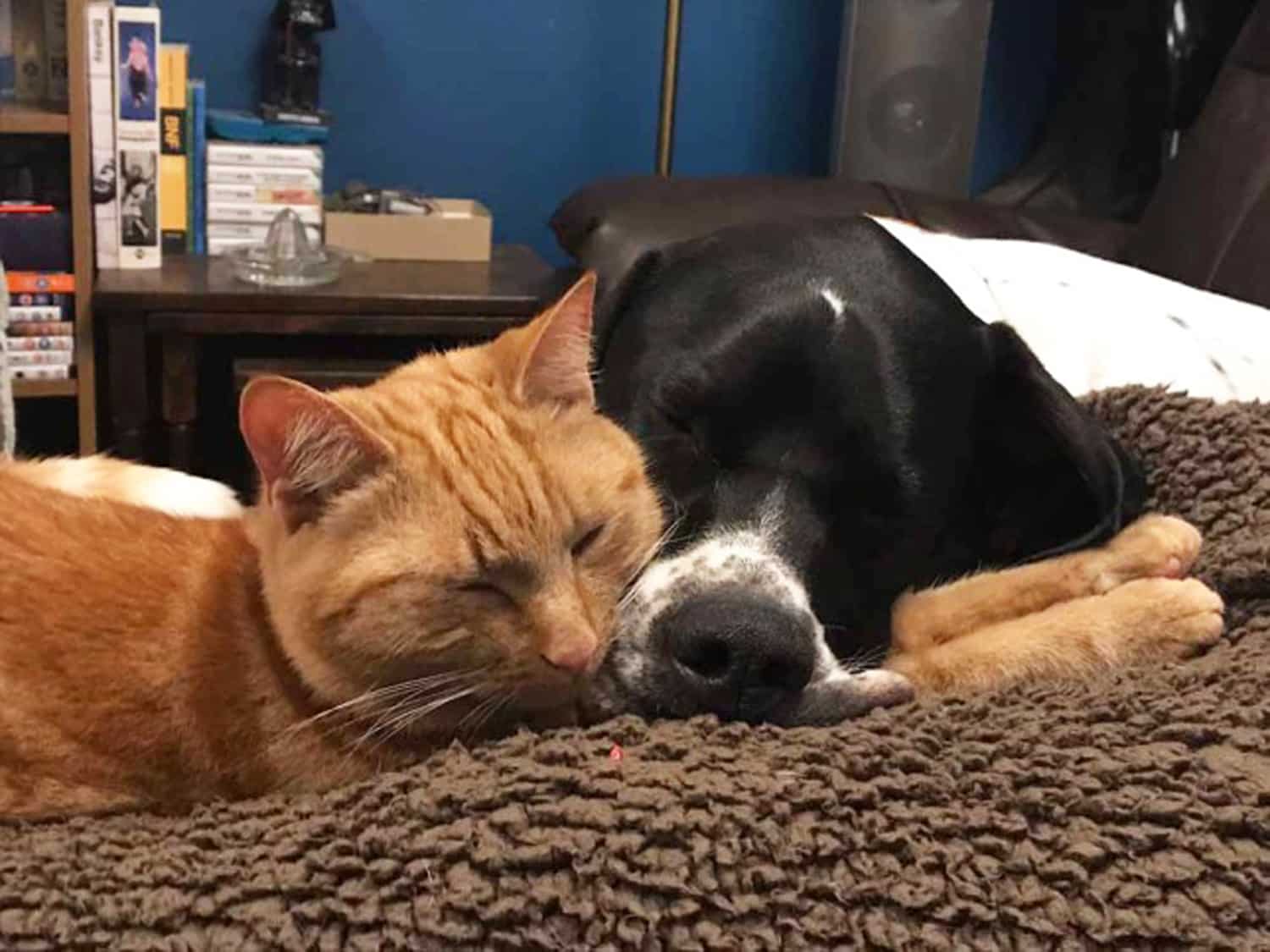Weasley & Spock: Hero cat and dog are regular blood donors to help other pets in need

An animal lover who spotted an appeal to give blood while she waited to see a vet has revealed that her two beloved pets are now regular donors.
Determined to help other animals in crisis, Mandie Pannell, 35, and her partner, Thomas Mills, 36, have now taken their five-year-old moggie, Weasley, to donate 10 times and six-year-old English pointer, Spock, five times.
University nurse educator Mandie, who lives near Potter’s Bar, Hertfordshire, is so proud of veteran donor Weasley that she entered him for a special hero award. ‘Weasley is absolutely a hero,’ she says.
‘He’s so good with the blood donations. He looks after the dog – especially when he’s scared – and he looks after our younger cat, who we are hoping will donate when he turns one.
‘Weasley’s so comfortable donating and purrs so much they even find it difficult to hear his heartbeat.
‘I entered him for the Petplan Pet Awards, in the Hero Pet of the Year category, as I also thought it would help spread the word about animal blood donors and he’s made it to the finals.
‘Not enough people know about animal – and especially feline – donors. ‘This is England – we’re a nation of animal lovers. We do things for each other. And it’s just a nice thing to be able to help someone else’s animal out.’
When Mandie and Thomas set up home together in 2015, they already had his dog, Spock – who he had raised since he was a tiny puppy – and black Labrador Banjo, who sadly died, aged 12, in 2017.
But, in November 2016, Weasley joined the clan as a surprise birthday present for Mandie’s 31st.
‘Thomas agreed to let me have a cat and, on my birthday on 3 November, he came home with Weasley – the best gift I’ve ever had,’ she says.
‘He’s named after the Weasley family in Harry Potter – as he’s ginger and he’s trouble! ‘He does occasionally still act like a kitten and he can be a bit of a handful. He’s extremely playful, loves cuddling, and loves “hunting” jumpers.’
Despite some rivalry, Weasley and Spock are very close.
‘From the get-go, Weasley has veered between bullying and cuddling up to Spock,’ says Mandie. ‘They’re like siblings – even if they sometimes hate each other. But they can also be really sweet together.’
In mid-2018, Weasley limped home late one summer evening with a wound on his back left leg. ‘It really upset me. We sensed that he’d attacked something and lost. He had a laceration and a bit of flesh missing from his leg,’ says Mandie.
Too late to go to their normal vets’ surgery, after looking up local out-of-hours providers, Mandie took Weasley to the nearby Royal Veterinary College.
‘We took him over there to be seen and they cleaned and dressed the wound and glued him up,’ she says. ‘While we were waiting, I saw a sign that they were looking for animal blood donors. I’d never known this to be a thing before that.’
Mandie made the decision to sign her furry friend up, knowing the importance of donating, as an experienced nurse. ‘Once he was all healed up and better, I emailed and asked for more information,’ she says. ‘They have to be clear of any medication for eight weeks, so about three months after the injury he gave his first lot of blood. ‘He’s just given his 10th donation – as it’s every three to four months for cats. He’s a true hero.’
Now, Mandie is contacted around every 12 weeks and asked to bring Weasley in over the next few days.
The team give him a thorough health check by a vet, shave a patch of fur and take blood, all while ‘giving him lots of fuss,’ according to Mandie.
‘I drop him off and they phone when the donation is finished,’ she says. ‘Then he gets intravenous fluids just to help him, as cats don’t recover as much as dogs, as they’re quite small. ‘The actual donation takes around 10 minutes and after three or four hours I go and pick him up.’
The service also assesses the animals beforehand to ensure they are suitable to be blood donors.
Mandie says: ‘One of the things I love about the donor service is that they are so good with animals. They assess them first and see if their temperament is suitable and they won’t be unduly stressed. ‘Weasley has been so chilled – he’s an ideal candidate.’ The amount of blood donated also depends on the weight of the cat – who must weigh 4lb minimum.
For Spock, who became a donor around the same time, the process is quicker, as dogs do not need rehydration fluids afterwards. ‘The teams that do this are absolutely amazing at keeping the animals calm,’ Mandie adds. ‘They’re also excellent at dealing with the worries of an owner – as sometimes it’s like with children, when the parents are more worried than the child.
‘But I know if something happened to one of my animals and they needed blood I’d want it to be there, so this really is important. ‘The idea of another pet owner not having access to the blood that could save their beloved animal just breaks my heart.’
When Mandie was emailed by Petplan, she immediately decided to put forward Weasley for the award.
‘Not enough people know about cat blood donation and I saw this award as a really good way to try and bring a little bit more awareness to it,’ she says. ‘And, of course, Weasley is a true hero, so he deserves to win.’
(Article source: Metro)





